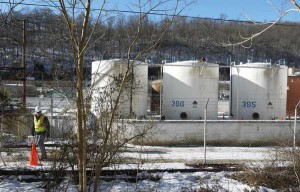|
Tell the West Virginia House of Delegates we won’t accept legislation that leaves our water systems, families, and communities at risk!The House is having a Public Hearing this Friday, March 6 at 8:30 am. It’s urgent that we pack the House on and let them know WE HAVEN’T FORGOTTEN!
B 423 rolls back inspection requirements.
SB 423 rolls back Spill Prevention and Response Plan requirements.
SB 423 rolls back permit requirements.
SB 423 creates an “opt out” option for nearly all tanks through modifications of existing permits or plans.
Call your Delegates (click here for directory) and leave this message: “Please amend SB 423 to restore strong water protections!”
Here’s What We Need from Our Lawmakers:
- Incorporate DEP’s risk-based rule. SB 423 does not incorporate DEP’s rule and would cause another year will go by without AST regulations in place – other than the initial registration, initial spill plans, and initial inspections. DEP’s Proposed AST Rule (47CSR63) was developed with extensive public input from industry and citizens to implement the Act. The rule divides tanks into three levels and requires more stringent protections for tanks that present the highest risks.
- Tanks that pose a risk to water supplies must be included. SB 423 exempts approximately 36,000 tanks from regulation under the Act. Roughly one-third of the deregulated tanks are located within 1,000 feet of a river or stream. These tanks should continue to be regulated under the Act as they are most likely to contaminate water if they should fail.
- Include stringent and explicit standards and accountability for tank and secondary containment integrity. The Freedom Industries disaster could have been avoided by regular tank inspections and mitigated by a well-maintained secondary containment system. It must be remembered that when there is a tank failure, the secondary containment system becomes the primary system: redundancy is the point!
- Require necessary information for source water protection planning. SB 423 creates new restrictions on disclosure of information that could prevent water utilities from being aware of threats to the water system. Information about the location and contents of tanks, including data on stored chemicals, must be shared with water utilities.
|





